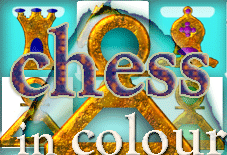* a) chess increases strategic thinking skills, stimulates intellectual creativity, and improves problem-solving ability, while raising self-esteem;
* b) when youngsters play chess they must call upon higher-order thinking skills, analyze actions and consequences, and visualize future possibilities;
* c) in countries where chess is offered widely in schools, students exhibit excellence in the ability to recognize complex patterns and consequently excel in math and science; and
* d) instruction in chess during the second grade will enable pupils to learn skills which will serve them throughout their lives.
-------------------
Academic Benefits Chess makes kids smarter. It does so by teaching the following skills:
* Focusing • Children are taught the benefits of observing carefully and concentrating. If they don't watch what is happening, they can't respond to it, no matter how smart they are.
* Visualizing • Children are prompted to imagine a sequence of actions before it happens. We actually strengthen the ability to visualize by training them to shift the pieces in their mind, first one, then several moves ahead.
* Thinking Ahead • Children are taught to think first, then act. We teach them to ask themselves “If I do this, what might happen then, and how can I respond?” Over time, chess helps develop patience and thoughtfulness.
* Weighing Options • Children are taught that they don't have to do the first thing that pops into their mind. They learn to identify alternatives and consider the pros and cons of various actions.
* Analyzing Concretely • Children learn to evaluate the results of specific actions and sequences. Does this sequence help me or hurt me? Decisions are better when guided by logic, rather than impulse.
* Thinking Abstractly • Children are taught to step back periodically from details and consider the bigger picture. They also learn to take patterns used in one context and apply them to different, but related situations.
* Planning • Children are taught to develop longer range goals and take steps toward bringing them about. They are also taught of the need to reevaluate their plans as new developments change the situation.
* Juggling Multiple Considerations Simultaneously - Children are encouraged not to become overly absorbed in any one consideration, but to try to weigh various factors all at once.
None of these skills are specific to chess, but they are all part of the game. The beauty of chess as a teaching tool is that it stimulates children's minds and helps them to build these skills while enjoying themselves. As a result, children become more critical thinkers, better problem solvers, and more independent decision makers.
Educational ResearchThese conclusions have been backed up by educational research. Studies have been done in various locations around the United States and Canada, showing that chess results in increased scores on standardized tests for both reading and math. A study on a large scale chess program in New York City, which involved more than 100 schools and 3,000 children, showed higher classroom grades in both English and Math for children involved in chess. Studies in Houston, Texas and Bradford, Pennsylvania showed chess leads to higher scores on the Watson Glaser Critical Thinking Appraisal and the Torrance Tests of Creative Thinking.
Social BenefitsIn the schools, chess often serves as a bridge, bringing together children of different ages, races and genders in an activity they can all enjoy. Chess helps build individual friendships and also school spirit when children compete together as teams against other schools. Chess also teaches children about sportsmanship - how to win graciously and not give up when encountering defeat. For children with adjustment issues, there are many examples where chess has led to increased motivation, improved behavior, better self-image, and even improved attendance. Chess provides a positive social outlet, a wholesome recreational activity that can be easily learned and enjoyed at any age.







